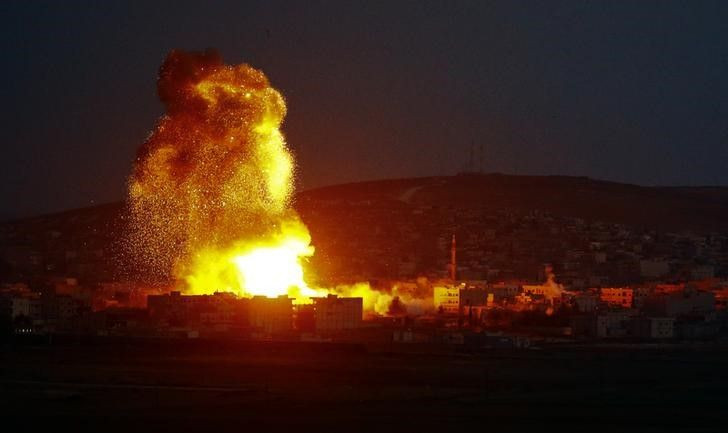Fight For Kobani Raises Questions About Obama's 'No Boots On Ground' Policy

A renewed push from Kurdish fighters on the ground and U.S.-led coalition forces in the sky over the past week marked a major reversal in fortunes in the fight for the Syrian border town of Kobani -- but at the same time it has underlined the major task facing the U.S.-led allied forces if it is to defeat the Islamic State group.
Halting the advance of the group also known as ISIS in Kobani, while both a strategic and symbolic success, has shown ISIS as a resilient and capable fighting force, raising questions about whether the U.S. can realistically remove the terrorist group from the vast swathes of land it occupies in Iraq and Syria without using ground forces.
“The fighting in Kobani showed that airpower alone can’t defeat ISIS and really you do need boots on the ground,” said James Phillips, senior research fellow for Middle Eastern affairs at the Heritage Foundation, a conservative-leaning Washington-based think tank. “But those boots don’t really have to be American, although I doubt the Kurds alone or acting with the Iraqi government are going to be able to dislodge ISIS anytime soon.”
President Barack Obama has said on multiple occasions that no U.S. combat troops would be deployed to either Syria or Iraq. The U.S. military's defense budget is being cut in preparation for forced sequestration in 2016, and there's no substantial public backing to send U.S. troops back to war in Iraq after a withdrawal from the country in 2011.
Instead, the U.S. decided to conduct airstrikes against ISIS in collaboration with ground offensives from Kurdish fighters in Syria and government forces in Iraq.
However, Obama’s airstrike-only policy came under fire when it showed no signs of slowing the ISIS advance in Syria or Iraq, as town after town and military bases fell into the hands of the jihadist fighters. But a combination of 50 airstrikes over a 72-hour period as well as U.S. forces dropping military supplies for the Kurdish fighters allowed the Kurds to take back around 80 percent of the town.
But defending Kobani is a far different scenario than taking back large chunks of Iraq and Syria that ISIS is already in full control of, Phillips suggested. For one, the Kurdish fighters had intimate knowledge of the town and had the advantage of a border with Turkey, where they could, at times, takes refuge and resupply.
ISIS brutality has also pushed some Americans to change their minds about intervening again in Iraq. Public opinion has shifted as the U.S. media prominently featured beheadings and the slaughter of thousands of Iraqi and Syrian civilians by ISIS.
A poll conducted in late September by the Wall Street Journal/NBC News and the Annenberg Public Policy Center found that 45 percent of Americans polled would support ground troops in the region, while 37 percent oppose them. Even those opposed believed there was an inevitability to combat troops ending up again in the Middle East: 72 percent of the 1,283 people polled from Sept. 19-25 believed that troops would be sent.
“There is evidence that the [beheading] videotapes had a major impact on American public opinion and I think Americans could be convinced that we need to get more heavily involved,” Phillips said, "but I cannot see the current administration changing their stance on the issue, regardless of what the public think.”
Obama has sent 1,500 troops to operate in an advisory role, but Republicans say that the only way to defeat ISIS is to introduce U.S. ground troops. Leading the charge is Sen. Lindsey Graham. The South Carolina senator called on U.S. troops to be sent in early October, echoing his Senate colleague John McCain and House Speaker John Boehner, who said that “somebody’s boots have got to be on the ground.”
“There is no way I can see how to fix the problem in Iraq and Syria without American ground troops,” he said in a CNN broadcast.
In contrast, Sen. Jack Reed, a Rhode Island Democrat, preferred to follow the president’s current plan. “Effective Iraqi military forces on the ground would actually be more effective than a short-term introduction of American forces. I think the most effective way to use the best aspects of both countries is our superior power in the air, our intelligence,” he said. “And make sure to get the Iraqi forces up to speed so they can be effective on the ground.”
© Copyright IBTimes 2024. All rights reserved.






















